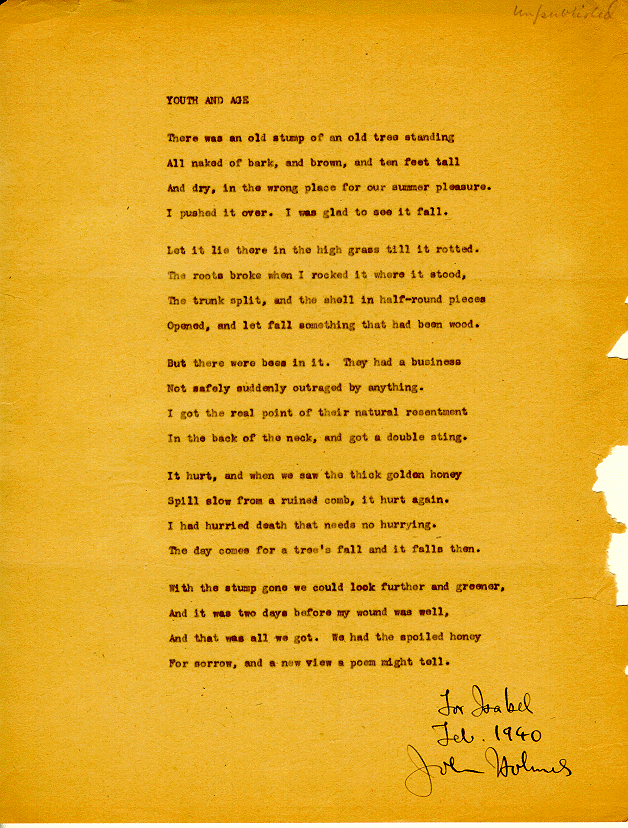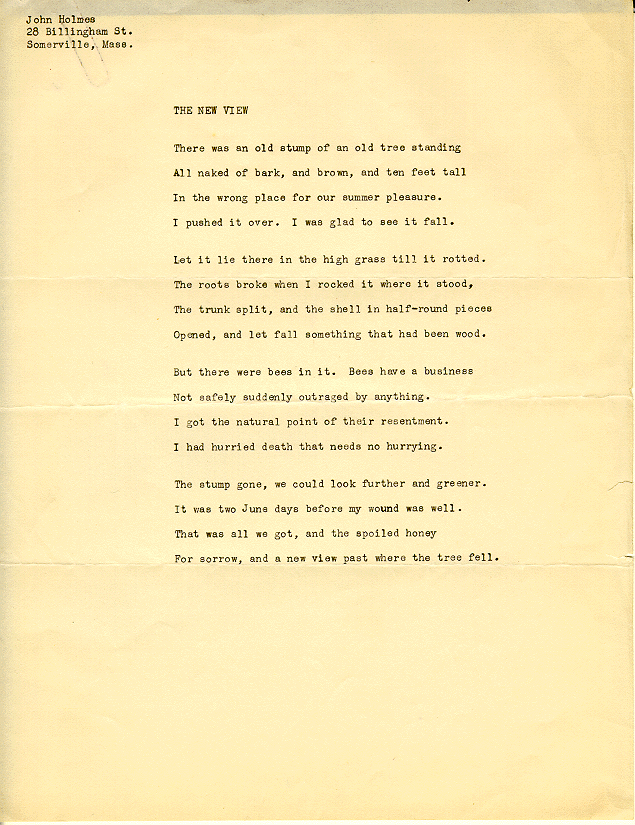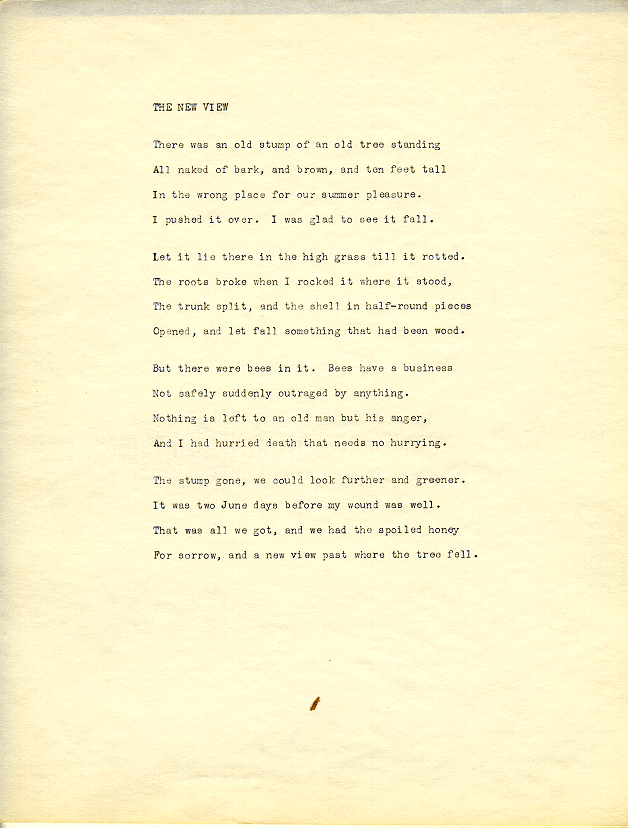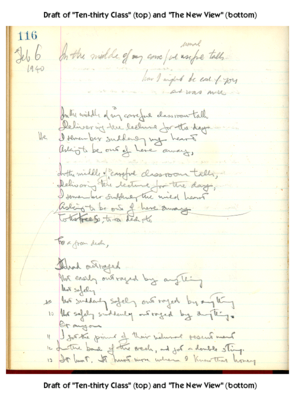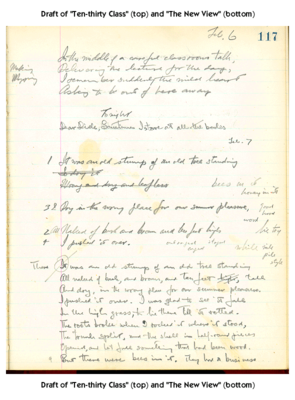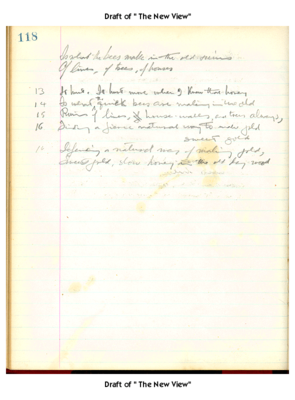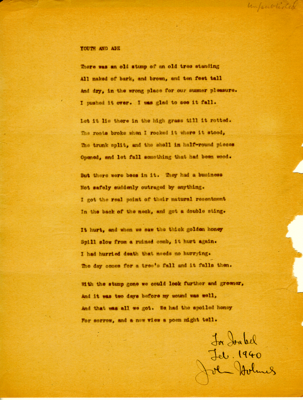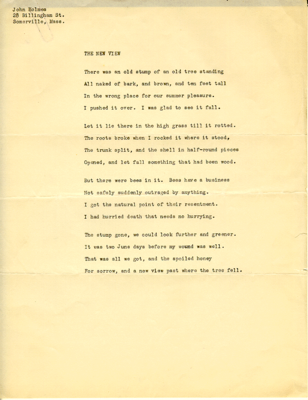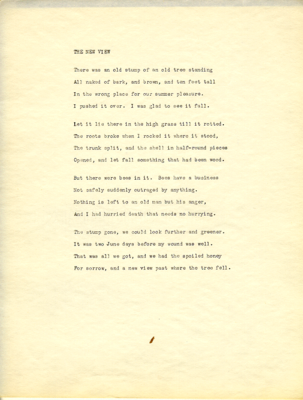The New View
From Writing Poetry (Boston: The Writer, Inc., 1960), 36-9.
It seems to me that very often the poet himself is not the one who knows most about the genesis of his poem; but for what it is worth, here it is:
The New View
There was an old stump of an old tree standing
All naked of bark, and brown, and ten feet tall
In the wrong place for our summer pleasure.
I pushed it over. I was glad to see it fall.
Let it lie there in the high grass till it rotted.
The roots broke when I rocked it where it stood,
The trunk split, and the shell in half-round pieces
Opened, and let fall something that had been wood.
But there were bees in it. Bees have a business
Not safely suddenly outraged by anything.
Nothing is left to an old man but his anger,
And I had hurried death that needs no hurrying.
The stump gone, we could look further and greener.
It was two June days before my wound was well.
That was all we got, and we had the spoiled honey
For sorrow, and a new view past where the tree fell.
We had been given for the summer a house in the green hills near Brattleboro, Vermont. It wasn't my house, so it wasn't my tree, either. But after a while I began actively to resent the tall old stump, sticking up between me and the other side of the valley like a pillar in a theater that cuts you off from the stage. It looked thoroughly dead to me, and I rationalized that my friends, who owned the house, would be glad of the obvious improvement I made to their estate by pushing the thing over one early evening.
What bit me was a wasp, not a bee. Bees, I think, don't store honey in such trees, but I looked at Article Four, Section G, of my poetic license, and decided I could and would mention bees and honey. Truth is truer than fact. I simply felt the red-hot sudden end of a wire in the back of my neck, and a somewhat similar prick of guilt, at the same time. When we set forth breakfast on the porch of that very pleasant house, next morning, I thought the view vastly bettered. But it was months later that I wrote the poem, and the poem is not about tree-stumps and bees (wasps) at all. It was sometime in the following winter that I had a brief, angry argument with my father, during which I showed the ignorant arrogance of a young man. He came back at me with considerable fire, truth, and authority, and it stung. The sting was that I had secretly harbored the thought that he was getting old; but he wasn't. The outburst, whatever it was about, was probably deeper down a fear and protest at the slow failure that had almost imperceptibly then begun. But there was plenty of temper and seniority left in him still, and I was ashamed and deeply stirred.
The emotional stir was what made me want to say something in a poem, something as retribution, I suppose, but anyway the stir. I think it is necessary to go further back for a cause. I notice that I have often written about, or used as an image, an old man, the tough old warm-spirited exasperating and terribly durable man. I don't know why this is. Maybe from reading much Yeats, and echoing to his bitter hatred of old age. Maybe, therefore, from a fear of my own old age, but maybe also because I hoped and hope to be one of the terribly durable old men. It could be carried deeper.
Suddenly I remembered the tree stump; it was my father, and I had tried to push him down. The actual tree, I now remembered, didn't push as easily as I had expected. It took a lot of rocking, and I did get stung for doing it. It was swift writing to set down the first eight lines. The decision was quite unconscious as to rhyme-scheme, alternate masculine and feminine (or was it?); the line-length, iambic pentameter, was merely habitual, I am afraid - though I still doubt that a shorter line or a fancier rhyme would have been appropriate. The tone was one of regret, even sorrow. I liked getting the effect of effort and heavy breathing in the divided fourth line, "I pushed it over. I was glad to see it fall," and the sound of satisfying vengefulness in the fifth, "Let it lie there-". There was also something that pleased me, and still does, like a lucky and graceful and successful stroke in a game, in the effect of running the seventh line over, from "the shell in half-round pieces" to "Opened, and let fall-" in the eighth. Nothing very wonderful, but a good rhythm, and the original emotion and action kept honest.
Then the real problem. How much was I to say about my father, or, if not of him, about old age? That's where I made it bees instead of wasps, because I needed, for myself at any rate, an image of something good damaged. Again, I did a little flourish of technique in bee-sound, "bees have a business-," but the key lines of the poem are the next two, "Nothing is left to an old man but his anger, And I had hurried death that needs no hurrying." I am dissatisfied now because I did not say more right there. The old man is not incidental, but central, and I suppressed, without wishing to, what was really the motive for the poem. From that point to the end, the double meaning is clear. It was years, not days, before my wound was well, if it is. The "further and greener" look was the new understanding I am still trying for. And the "spoiled honey" is that grief I felt and feel for what I so hastily said, for the tree stump I too impulsively pushed over to rot in the grass.
There are three typescript drafts of "The New View" in the John Holmes Collection. In addition, there are drafts of the poem in the notebook found in box 16, folder 2, which provide the earliest versions of the poem in the collection.



